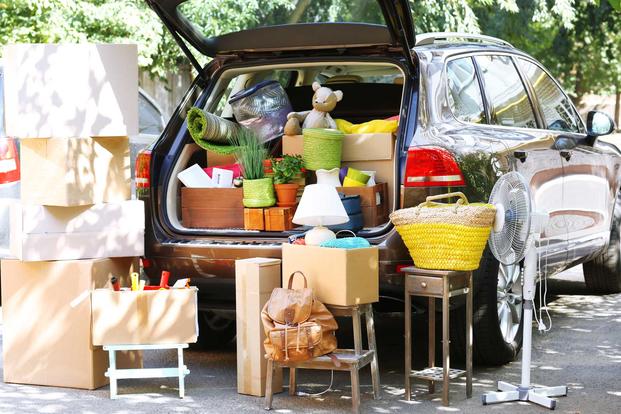When changing duty stations, moving from one residence to another can produce a lot of unnecessary waste. In the flurry to vacate a home, things that can't be transported often get thrown away.
As fuel prices surge and the climate crisis intensifies, the following tips can help you minimize move-related waste and make your next permanent change of station (PCS) more Earth friendly.
1. Know What Can't Go
When a move is on the horizon, a little advanced planning goes a long way toward eliminating excess and waste. Knowing which items aren't transportable can help avoid scrambling on moving days.
The most common prohibited household items include hazardous materials (like propane tanks) and liquids, including cleaning supplies, unsealed beverages and paint. Depending on the movers, houseplants, building supplies, candles, batteries and ammunition may not be transported.
During the pre-move inspection, confirm with your movers what they will and won't pack. Start gathering those items and find them a new home so they don't get thrown out.
2. Lighten Your Load
One of the simplest ways to cut down on waste is to minimize the total weight of your belongings.
Professional organizer and Air Force brat Sydney Spencer strongly recommends sorting through your things before the moving truck comes.
"When you're hauling less material, your movers are going to pack fewer boxes and use less fuel," she said.
Spencer says waiting to go through everything at your next duty station is unrealistic and time-consuming.
"If you move it all, you're going to be completely overwhelmed in your new space. You're not going to take the time to sort through it. You're going to want to spend that time getting settled," she said.
3. Find Everything a Home
Whether PCS-ing or organizing clients' homes, Spencer is an advocate for selling or giving away items online through Buy Nothing groups, hyper-local Facebook groups where items are posted and given away for free; local swap pages; and Facebook Marketplace.
"Whatever it is, take a picture and put it in your swap group. Someone will literally come pick it up from your house," she said. "You're also benefiting people in your community because the person who's coming to get it really wants it, whereas donating doesn't always guarantee the item will be used again."
Free marketplace groups, which are great for passing along boxes and packing paper, are also useful for speed gifting, when you need an item gone in a few hours. If donating is preferred, Spencer suggests seeking out local shelters before resale shops.
4. Make a Plan for Food and Liquids
Since perishable food and opened liquids likely won't be coming with you, finish what you can and give away the rest. For two months before your move, avoid buying new condiments, soaps and cleaning supplies.
Ask a friend or neighbor to take your leftovers. Spencer said she's even had luck giving away half-opened pantry items and perishable foods in her swap group.
"Consider how many people in your immediate vicinity are hurting right now," she said. "You're looking at job loss, COVID, inflation. Some people are happy to accept opened food."
If you're shipping a personal vehicle at your own expense, ask the transport company whether they'll allow extra items. This is a great way to ship liquids and pantry staples, as well as useful first-week items like towels, toys and cleaning supplies that you won't have to repurchase for your new home.
5. Not Moving? Do Maintenance Sorting
To avoid getting overwhelmed by stuff during a move, Spencer recommends combing through each room periodically.
"You don't have to do the whole house at once. Pick a bathroom. Sift through it quickly, and get rid of things that have been collecting dust," she said. "Give them away in a Buy Nothing group, and someone will be using them instead of them just sitting there."
6. Limit Your Intake
Finally, the best strategy for reducing waste, Spencer says, is to limit what you allow in your home.
"If you're mindlessly shopping, you're going to leave with so much stuff. Before you check out, pull your cart over and go through it," she said. "I ask myself the W questions. 'Why am I buying this? Who is it for? Will I actually use this? What would I use it for?'"
Some tips for owning less are to ask family members for experiences as gifts and local memberships instead of physical items and to shop from a list instead of browsing clearance racks.
"In the long run, you're producing less waste that you're not going to need to sell or donate," Spencer said. "Plus, you're saving yourself time and money."
Read the original article on MilitaryFamilies.com.















